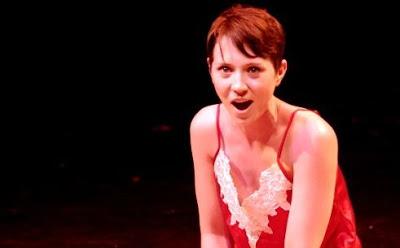by Paul J. Pelkonen

Bound for glory: Greer Davis as Poppea in L'Incoronazione di Poppea
at Dell'Arte Opera Ensemble's Summer Repertoire Project.
Photo by Angel Roy © 2013 Dell'Arte Opera Ensemble.
This production, at the E. 13th Street Theater, used Spartan sets and minimal production values to depict the majesty of Ancient Rome. With these simple visuals, a successful performance rode on the voices. In Monteverdi operas, the very novelty of the operatic form meant that each aria or ensemble broke new musical ground, and the whole cast seemed aware of the imminence and importance of performing this particular opera. It helps that the libretto is a red-blooded reversal of history that presents the ignoble Poppea and Nero as the heroes of the day.
Victoria Crutchfield's direction blended modern sensibilities, steampunk style and a hint of Roman decadence to create a representational Roman setting that was effective despite the shoe-string budget. A rolling set of curtains and a tiled mosaic (covered and uncovered by changeable floor surfaces) served as a central acting surface. The show's prologue and epilogue (featuring the "contest" between the gods of Fortune, Virtue and Love that drives the plot forward) were staged as a mini-audience before the opera, with the opera's actual characters drawn from the little crowd and pulled deep into the story.
This fine cast of young singers was led by soprano Greer Davis in the title role, a Roman noblewoman whose torrid affair with the Emperor Nero (Alison Taylor Cheeseman) leads to her elevation to the position of Empress of Rome. Ms. Davis' small but pleasant soprano proved pliant, capable of intimate intertwinings with Nero in one scene and flights of vocal ornamentation in key moments. Ms. Cheeseman was an edgyNero, depicting a hint of the emperor's legendary instability (even sniffing cocaine at one point in the show) while melting to butter in the presence of Poppea.
The intent and purpose of Dell'Arte's summer program is to provide young artists with a six-month opera boot camp in which to hone their musical, acting and diction skills. But the cast for Poppea had its share of known artists too. Chief among these was countertenor Jeffery Mandelbaum, who has found a way off of the Metropolitan Opera's Enchanted Island to appear in this show. As Ottone, his voice had a clear, sweet tone that caressed the ear, important in the Act II scenes when the character performed a long (and frequently cut) monolog. Drusilla was played by soprano Rachel Barker, a coquette who came into her own in the last act.
In the smaller roles, the finest performance came from towering bass Hans Tashjian as Seneca, the Roman senator and philosopher whose opposition to Nero leads to self-slaughter in the bathtub. His Act I and II scenes displayed a firm, resonant instrument and a gravid stage presence that led weight to this historically significant philosopher and author. Octavia, the noblewoman whose jealousy of Poppea leads to the opera's murder plot was sung by Katherine Howell, an operatic heroine in the making with a sweet tone and compelling stage presence.
The singers were helped by taut ensemble playing from conductor Jeffery Grossman and The Sebastians, a period chamber ensemble who managed to convey the majesty and complexity of Monteverdi's score. In that small space, it was refreshing to hear the orchestral details of cello, theorbo and violins emerge and twine with the voices, as the instruments commented on the action or simply supported the singers' line. This massive score was performed with much of the work cut or played at a generally fast, yet precise tempo, compressing the action effectively and never losing the show's dramatic sensibility.

